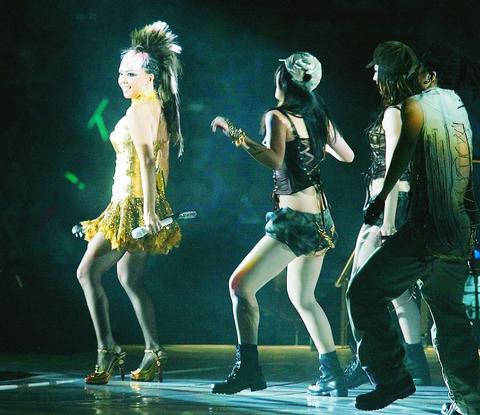Pop music diva Chang Hui-mei (張惠妹), also known as A-mei, returned home early yesterday after performing in a controversial concert in Beijing on Saturday night. The singer was following through on her earlier vow to hold the Beijing concert despite threats of disruption by Chinese ultra-nationalists.
Throngs of protesters heckled the Puyuma Aboriginal singer, holding red banners protesting "pro-independence Taiwanese businesspeople." Her Chinese fans rushed to her defense, however, leading to scuffles between the two groups, which were quickly broken up by Chinese police.

PHOTO: AP
According to media reports, A-mei's fans begged her not to be disturbed by the raucous protesters, who were also demanding that A-mei sing March of the Volunteers, the Chinese national anthem.
The singer reportedly broke down and wept onstage, even as her Chinese supporters cheered her on and called out to her not to cry. A-mei told the estimated 10,000-strong audience that she had never felt such great pressure at a concert before.
Still, the 31-year-old singer from Taitung County carried on and finished her set.
A-mei became the focus of international controversy on June 12 when she was forced to cancel a concert in Hangzhou after students from Zhejiang University branded her a "supporter of Taiwanese independence." Several hundred students invaded a press conference at which the pop star had been scheduled to appear, chanting slogans and holding banners decrying the "green performer." Fearing for A-mei's safety, the organizers canceled her appearance.
However, the Mainland Affairs Council later described the students as "Beijing's dupes," who were probably acting with official encouragement.
The lambasting of Taiwanese performers for their supposed political preferences is a common occurrence in China. Internet discussion boards and forums often carry virulently aggressive messages attacking Taiwanese "splittists," China's propaganda term of choice for pro-independence or anti-unification figures.
After the re-election of President Chen Shui-bian (
A-mei initially gained the attention of Chinese authorities after singing the national anthem at Chen's inauguration in 2000.
At that time, the singer was blacklisted, lost a sponsorship deal with the Coca-Cola company and was subjected to a media blackout in China.
Yesterday, in a bizarre turn of events, some pro-independence groups called for a boycott of A-mei in response to comments she made upon her return, which were apparently meant to mollify her Chinese critics.
"I'm a Chinese person, and I sing Chinese people's songs," the singer told reporters at CKS International Airport.
"Shame on you A-mei. You are an embarassment to Aborigines and all Taiwanese people," one contributor wrote on a forum discussing A-mei at www.southnews.com.tw.

Taiwan has received more than US$70 million in royalties as of the end of last year from developing the F-16V jet as countries worldwide purchase or upgrade to this popular model, government and military officials said on Saturday. Taiwan funded the development of the F-16V jet and ended up the sole investor as other countries withdrew from the program. Now the F-16V is increasingly popular and countries must pay Taiwan a percentage in royalties when they purchase new F-16V aircraft or upgrade older F-16 models. The next five years are expected to be the peak for these royalties, with Taiwan potentially earning

STAY IN YOUR LANE: As the US and Israel attack Iran, the ministry has warned China not to overstep by including Taiwanese citizens in its evacuation orders The Ministry of Foreign Affairs (MOFA) yesterday rebuked a statement by China’s embassy in Israel that it would evacuate Taiwanese holders of Chinese travel documents from Israel amid the latter’s escalating conflict with Iran. Tensions have risen across the Middle East in the wake of US and Israeli airstrikes on Iran beginning Saturday. China subsequently issued an evacuation notice for its citizens. In a news release, the Chinese embassy in Israel said holders of “Taiwan compatriot permits (台胞證)” issued to Taiwanese nationals by Chinese authorities for travel to China — could register for evacuation to Egypt. In Taipei, the ministry yesterday said Taiwan

Taiwan is awaiting official notification from the US regarding the status of the Agreement on Reciprocal Trade (ART) after the US Supreme Court ruled US President Donald Trump's global tariffs unconstitutional. Speaking to reporters before a legislative hearing today, Premier Cho Jung-tai (卓榮泰) said that Taiwan's negotiation team remains focused on ensuring that the bilateral trade deal remains intact despite the legal challenge to Trump's tariff policy. "The US has pledged to notify its trade partners once the subsequent administrative and legal processes are finalized, and that certainly includes Taiwan," Cho said when asked about opposition parties’ doubts that the ART was

If China chose to invade Taiwan tomorrow, it would only have to sever three undersea fiber-optic cable clusters to cause a data blackout, Jason Hsu (許毓仁), a senior fellow at the Hudson Institute and former Chinese Nationalist Party (KMT) legislator, told a US security panel yesterday. In a Taiwan contingency, cable disruption would be one of the earliest preinvasion actions and the signal that escalation had begun, he said, adding that Taiwan’s current cable repair capabilities are insufficient. The US-China Economic and Security Review Commission (USCC) yesterday held a hearing on US-China Competition Under the Sea, with Hsu speaking on